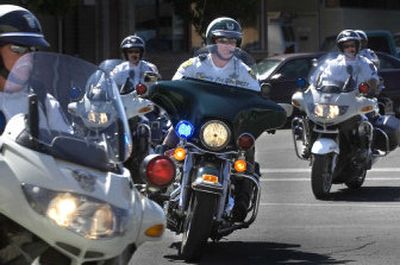Cops make traffic-stopping practice run

Over the low rumble of Harley-Davidson engines and the buzz of idling BMW motorcycles, Sgt. Rick Dobrow’s command rattled through the radios to his assembled force of white-shirted police: “OK, let’s roll.”
From that point on, busy downtown Spokane streets, crowded Interstate 90 and lonely country roads were virtually shut down as a cavalcade of motorcycles cleared a safe path for a convoy of unmarked police cars.
It was motorcade training day Wednesday for Spokane and Coeur d’Alene police and sheriff’s deputies, an opportunity for about 20 motorcycle officers to test their wheels at escorting dignitaries through city streets.
Normally, the dignitary is someone like the president of the United States, the vice president or a Cabinet member. But for the training exercise Wednesday, the “dignitary” was police Lt. Dean Sprague and his wife, Jennylyn.
“I am ‘the package,’ ” Sprague coolly said from the charcoal-gray Chevy Tahoe he drove, referring to the nickname police give the escorted vehicles.
Traffic along Browne Street was blocked while the cars passed. Three lanes of Interstate 90 were ground to a halt while the convoy climbed onto the freeway’s raised viaduct. Bewildered drivers scratched their heads, trying to sneak a peek into the tinted black windows of the SUVs.
Spending time on the open road on a pleasant summer day is an enjoyable way to work, but with a swarm of 20 motorbikes negotiating hectic intersections, it’s no day in the park, Dobrow said.
“Oh, it’s fun,” he said, tempering his voice a moment and then saying, “but it is very dangerous.”
Motorcycle officers ride in lines in front of the escorted vehicles, then pull off from the front of the pack to stop traffic at intersections and allow the rest to go through. After they are given a signal from an officer in the rear wearing bright orange gloves, they accelerate and pass the motorcade on the right, rejoining the pack until they find themselves back at the front of the line.
At times when the motorcade was on I-90, driving toward Fairchild Air Force Base, motorcycles reached 90 mph when they passed the police cruisers.
“Doing a motorcade is one of the most dangerous things a motorcycle officer does,” Dobrow said.
The motorcade came to a rest in two neatly paired lines near an abandoned gate to Fairchild Air Force Base and the officers gathered around, all wearing white shirts and sunglasses. While the motorcycle’s engines clicked as they cooled down, Dobrow gave an assessment of their performance.
The event took place without incident, except for one fault as they approached the freeway.
“We came to a dead stop on Browne,” Dobrow said. “That’s unacceptable.”
In a presidential escort situation, the commander-in-chief’s limousine doesn’t stop for anything, Sprague said.
“All in all, everybody looks really good,” Dobrow said. Last year, when Spokane police found out they were responsible for getting President Bush safely to a re-election fund-raiser, officers quickly learned how to conduct motorcycle escorts. Some of those early test runs were pretty shaky, he said.
“The reason we bring these up is to do it in training and not when some dignitary shows up and we get embarrassed,” Dobrow said. “You get rusty after a while. It’s a perishable skill.”
“When we’re actually doing it in a real situation, it’s one of the best parts of the job,” said Jason Reynolds, a motorcycle officer who filled his gas tank before the exercise and waited in the shade of the Opera House for the others to arrive. Though he didn’t participate last year, escorting the president is “the pinnacle of all escorts.”
Dobrow doesn’t know when the skills of Spokane’s motorcycle escorts will be used again. A dignitary like the president or vice president, as well as some Cabinet members, usually requires the use of a motorcade, he said.
After the return trip to Spokane, Dobrow debriefed the riders in the shadow of the Spokane Arena. “The last run looked really good,” he said. “There were no mistakes.”
Just as officers got ready to finish up their training and head out, a call came across the radio about a woman who wouldn’t pull over and was driving east on Boone.
Some of the officers hopped on their bikes and sped away in pursuit.
“If only we heard about it earlier, we could have cleared out all the intersections along the way,” Dobrow said with a laugh.